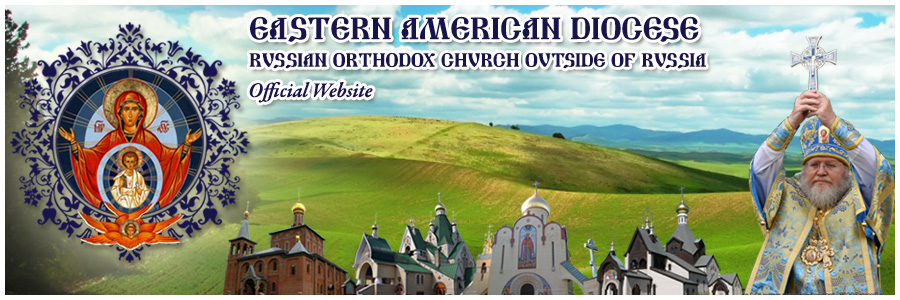Русская
Версия
Life
of Priest-Martyr
Vladimir (Medveduk)
Nov.
20/Dec. 5
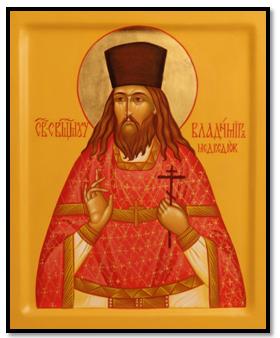 Priest-martyr
Vladimir was born July 15th, 1888, in Poland, in the city
of Lukov of the Sedeletsk gubernia (province – A.K.*), in the
God-fearing family of a railroad worker, Faddey Medveduk. On his
deathbed, the father said to his son Vladimir: “My child, I yearn so
much for you to become a priest or at least a psalmist, as long as you
are a servant of Church.” The son responded that it was also his
wish.
Priest-martyr
Vladimir was born July 15th, 1888, in Poland, in the city
of Lukov of the Sedeletsk gubernia (province – A.K.*), in the
God-fearing family of a railroad worker, Faddey Medveduk. On his
deathbed, the father said to his son Vladimir: “My child, I yearn so
much for you to become a priest or at least a psalmist, as long as you
are a servant of Church.” The son responded that it was also his
wish.
Upon
graduating in 1910 from a seminary, Vladimir served as a psalmist in
Radomsk Cathedral in Poland. Peaceful life was interrupted by World
War I, and Vladimir Faddeevich, like thousands of others, became a
refugee. Upon his arrival to Moscow, he met Varvara Dmitrievna
Ivanukovich, who was descended from a deeply religious family in
Belarus and was also a refugee. In 1915 they married.
In
1916 Vladimir Faddeevich was ordained a deacon for the parish of
Martyr Irina on Vozdvizhenka in Moscow. There he served until 1919 and
then was ordained a priest for St. Savva parish on Tverskaya Street.
In 1921, he was appointed a rector of the parish of St. Mitrofan of
Voronezh in Petrovskiy Park in Moscow.
From
the very first days of his service in the church of St. Mitrofan,
Father Vladimir endeavored to organize and order the parish life. In
that ocean of passions, misfortunes, and suffering that was the Soviet
Russia of the time, his parish became for believers an island of love.
The young priest zealously carried out the duties of his ministry, and
immediately attracted religious youth, which he took pains to instruct
in the love of the Orthodox service and the Church. The church of St.
Mitrofan was often visited by choirs from other parishes attracting
many believers and lovers of church singing. So much so, that at times
the church could not contain all the visitors.
This
was the time of the New Church (a reformist, schismatic movement –
A.K.) debauchery, when with the help of the godless authorities, the
schismatics seized Orthodox churches with impunity. To avoid such a
lawless seizure, Father Vladimir locked the church himself after every
Divine Service and took the keys home with him. Seeing that they
cannot seize the church without the priest’s acquiescence, revivers
invited Father Vladimir to the reviver’s Bishop Antonin (Granovsky).
Demanding the keys from the church of the priest, he hollered:
Give
me the keys!
No,
Vladyka, I won’t! – Responded Father Vladimir.
I’ll
kill you! I’ll kill you like a dog!
Kill
me, – responded the priest. – We will stand together in front of
the Divine Throne.
That’s
how you are! – said Bishop Antonin, ceasing his demands. And so, the
revivers failed to take over the church.
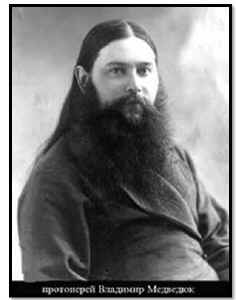 In
1923, Father Vladimir was awarded a camilavka. In 1925, authorities
arrested the priest and, wielding spurious accusations, threatened him
with imprisonment in a concentration camp. The only way to regain his
freedom, they insisted, was through cooperation with the OGPU (the
[secret] police – A.K.). Father Vladimir agreed and was consequently
freed. For a while, the OGPU gave him some sort of tasks, usually
having to do with the Place-Keeper Metropolitan Petr, which he
fulfilled. As more time passed, however, the more discord he felt with
his conscience and the more tormented he was by his situation. Neither
his zealous service in church, nor his conscientious service of his
flock, could quiet this burning spiritual pain. Finally, Father
Vladimir decided to end his relations with the OGPU as their secret
agent, and confessed the sin of betrayal to his father-confessor. On
December 9th 1929 an OGPU detective summoned him with a
subpoena to one of the offices on Bolshaya Lubyanka (OGPU headquarters
– A.K.) and demanded an explanation. Father Vladimir stated to him
that he refused to cooperate any further. The next three days were
spent trying to talk him into changing his decision, but Father
Vladimir steadfastly refused, declaring that it was no use, because he
had already told it all to a priest in confession. On December 11th,
an order for his arrest was signed, and he was charged with
“divulging… information that was not to be disclosed.” On the 3rd
of February, 1930, the Board of OGPU sentenced him to three years in a
concentration camp, which he served on the construction of the
Belomorsko-Baltiyskiy canal.
In
1923, Father Vladimir was awarded a camilavka. In 1925, authorities
arrested the priest and, wielding spurious accusations, threatened him
with imprisonment in a concentration camp. The only way to regain his
freedom, they insisted, was through cooperation with the OGPU (the
[secret] police – A.K.). Father Vladimir agreed and was consequently
freed. For a while, the OGPU gave him some sort of tasks, usually
having to do with the Place-Keeper Metropolitan Petr, which he
fulfilled. As more time passed, however, the more discord he felt with
his conscience and the more tormented he was by his situation. Neither
his zealous service in church, nor his conscientious service of his
flock, could quiet this burning spiritual pain. Finally, Father
Vladimir decided to end his relations with the OGPU as their secret
agent, and confessed the sin of betrayal to his father-confessor. On
December 9th 1929 an OGPU detective summoned him with a
subpoena to one of the offices on Bolshaya Lubyanka (OGPU headquarters
– A.K.) and demanded an explanation. Father Vladimir stated to him
that he refused to cooperate any further. The next three days were
spent trying to talk him into changing his decision, but Father
Vladimir steadfastly refused, declaring that it was no use, because he
had already told it all to a priest in confession. On December 11th,
an order for his arrest was signed, and he was charged with
“divulging… information that was not to be disclosed.” On the 3rd
of February, 1930, the Board of OGPU sentenced him to three years in a
concentration camp, which he served on the construction of the
Belomorsko-Baltiyskiy canal.
Meanwhile,
his family was evicted from the church property and became homeless.
That was what the clergyman had feared most of all. While
incarcerated, he began to ardently pray to holy St. Sergius and his
parents, schema-monk Cyril and schema-nun Maria, that by their prayers
his family could find themselves a shelter. And it was in Sergiev
Posad (St. Sergius monastery – A.K.) that they found themselves a
sanctuary. At first they were aided in this by Olga Serafimovna
Defendova, a well-known benefactress, who in the 1920’s served the
sick Metropolitan Makariy (Nevsky) in Nicolo-Ugreshskiy monastery.
In
1930, on the Holy Day of the Elevation of the Cross of the Lord,
Father Vladimir’s son Nikolay entered Elijah Church in Sergiev Posad.
When he approached for the anointing, the rector of the church, Father
Alexander Maslov, said to him:
This
is the first time, young man, that I see you in our church.
We,
batyushka, are in big trouble, – said Nikolay. – There are five of
us left; my father’s been taken. So mother and Olga Serafimovna have
been looking for shelter for two days throughout the city. As soon
they find out that there are five children, no one wants to rent to
us. We don’t know what to do.
Father
Alexander called over one of the women parishioners and said to her:
Nadezhda
Nikolayevna, you yourself are in great affliction, so you should
understand and receive this family.
Father,
bless. – She responded.
That
is how they ended up with the Aristov family. A few months before
this, the head of the household, a deacon of the Ascension Church, had
been arrested and executed by a firing squad. His home became a safe
harbor for Father Vladimir’s family for many years to come. After
finishing his time in 1932, Father Vladimir lived here with his family
and traveled to Moscow to serve in the parish of St. Mitrofan. In
1933, the church was closed by the authorities, and Father Vladimir
received a place in Trinity Church, in the village of Yazvische of the
Volokolamsk region.
In
1935, Father was elevated to the rank of archpriest. In Yazvische,
Father Vladimir was given a small church guardhouse with only two
windows, which is where the whole family moved in. Living there was
crowded, but the parish had no other quarters. One day, a neighbor
from across the street came to them and said: “Father Vladimir, I
offer you my home. Live for as long as you want, I don’t need a
kopeck from you.” For the next ten years, the family of Archpriest
Vladimir lived in the house of this benefactor.
At
that time, there were many in the Volokolamsk region that had returned
from internal exile and were prohibited from living in Moscow. Among
them, there was Archdeacon Nikolay Tzvetkov, who was admired by
believers for his ascetic life and prescience. Archpriest Vladimir
often visited him for the resolution of difficult issues. Once,
Archdeacon Nikolay asked him to serve at night in his house. The
windows were tightly covered with curtains. They put on their
vestments; there were just a few parishioners. Suddenly, during the
service, someone knocked on the window. The memories of the jail and
the camp were still fresh, and Father Vladimir began to take off his
vestments. “Father Vladimir, do not lose heart; stay as you were.
We’ll soon find out.” – Said Father Nikolai. As it turned out,
it was just a passerby, who wanted to find out how to get to the
station.
The
last time Father Vladimir came to Archdeacon Nikolay was in the spring
on 1937 to congratulate him on his saint’s day. But the Archdeacon
did not even come out, only said from behind the door: “Christ is
Risen!” That was all. Father Vladimir grew very upset and asked the
woman servant (poslushnitza – one who is in spiritual obedience. -
A.K.) of the godly man to tell him, that this is Father Vladimir from
Yazvische to congratulate him on his saint’s day. She did as told;
Father Archdeacon repeated to her: “Say to him: Truly He is
Risen!” Father Vladimir was very upset, because he realized that
this was said by the prescient elder as a sign that they would not
meet again in this life.
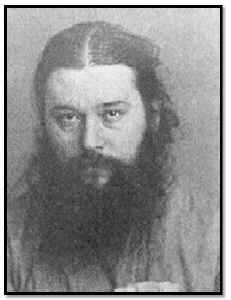 In
the summer of 1937, mass arrests began. In November, Archpriest
Vladimir visited Moscow and said upon returning that he was sure he
would soon be arrested. “It is not the exile and death that I
fear,” he said. “I fear the journey there; when they drive the
prisoners tens of kilometers a day; and the guards finish off those
who fall down with the stocks of their rifles; and then wild animals
come out to devour their dead bodies.”
In
the summer of 1937, mass arrests began. In November, Archpriest
Vladimir visited Moscow and said upon returning that he was sure he
would soon be arrested. “It is not the exile and death that I
fear,” he said. “I fear the journey there; when they drive the
prisoners tens of kilometers a day; and the guards finish off those
who fall down with the stocks of their rifles; and then wild animals
come out to devour their dead bodies.”
On
November 11th of 1937, a report came in the Volokolamsk
NKVD (predecessor to the KGB – A.K.) stating that there was a
meeting held in the village of Yazvische, which had almost no youth
attending. Allegedly, Nikolai, the son of Archpriest Vladimir, held an
alternate meeting not far from the reading house, where the sanctioned
meeting was taking place; and all the youth joined him. The report
also stated that the priest was being visited daily by as many as
twenty people, mostly old men and women from various kolkhozes
(collective work settlements – G.L.) of the Volokolamsk and
Novopetrovsk regions. On November 24th of 1937, an arrest
order was issued for the priest.
On
the eve of November 25th, Father Vladimir, who was going to
serve a funeral liturgy the next day, was standing by the window in
his room reading the priest’s prayer rule. Besides the priest’s
family, there were two monastic novices in the house, Maria Briantzeva
and Tatiana Fomicheva, who after the forced closing of their monastery
lived at Trinity Church performing the duties of the psalmist and the
altar cleaner. That evening, they were helping the priest’s spouse
to cut cabbage. Suddenly, Father Vladimir saw the president of the
village Soviet and a militiaman walking past his window. “I think
they are coming for me,” said Father Vladimir to his daughter. A few
minutes later they were already in the house. “Let’s go to the
village Soviet, we need to clarify something,” said one of them.
Father Vladimir began to say good bye to everyone, while the NKVD man
purposely hurried him, saying that he would be back soon. Father
Vladimir knew, though, that he would not return. So, he blessed
everyone and said to his daughter: “It is doubtful, my little one,
that we will see each other again.” Along with him, novices Tatiana
and Maria were also arrested.
On
the same day, the priest’s spouse, Varvara Dmitrievna, put together
a package and brought it to the village Soviet, but was not allowed to
visit her husband, and was told instead that in the evening they would
come to search the house. Late at night, the same NKVD man came back
and with a furious uproar began to conduct the search. The shelves
creaked, the books fell. The search came down to him taking some
random items and throwing them, without a record, in some bags.
Interrogations
began immediately after the arrest. First, on November 26th,
the president and the secretary of the village Soviet, as well as the
“witnesses du jour,” were called in and signed sworn testimony
that had been prepared by the detective. On the same day, Archpriest
Vladimir was interrogated.
“The
inquest has evidence,” declared the detective, “That your quarters
are often visited by nuns and believers from nearby settlements of the
Volokolamsk and Novopetrovsk regions. Give your testimony on that
issue.”
“Fomicheva
and Briantzeva have visited my quarters, but very infrequently.
Believers visit my quarters only with religious needs.”
“The
inquest is aware that there have been meetings in your quarters. In
these meetings, you discuss the policies of the Party and the
Soviets.”
“There’ve
never been any meetings at my quarters.”
“The
inquest has evidence that you conduct counterrevolutionary and
anti-Soviet agitation with various persons in your acquaintance.”
“I
have never engaged in counterrevolutionary and anti-Soviet
agitation.”
“Your
testimony is false. In connection with your case, a number of
witnesses have been interrogated who confirm you conducted
counter-revolutionary and anti-Soviet agitation. The inquest demands
truthful testimony.”
“I
declare again, that I have never conducted counterrevolutionary and
anti-Soviet agitation.”
Novices
Mariya Briantzeva and Tatiana Fomicheva were interrogated on the same
day.
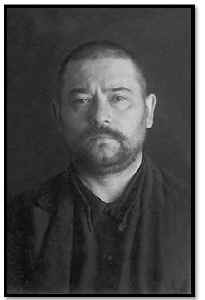 Novice
Maria Briantzeva was born in 1895 in the village of Severovo of the
Podolsk region of the Moscow province in the family of a peasant
Grigoriy Briantzev. The farm was not a big one – a house with
attachments, two sheds, a barn, a horse, and a cow. In 1915, when the
girl turned twenty, she joined a monastery as a novice. After the
revolution, she continued in the Boris-and-Gleb monastery in the
Voskresensk region until its closure in 1928. That same year, she
returned to her native Podolsk region.
Novice
Maria Briantzeva was born in 1895 in the village of Severovo of the
Podolsk region of the Moscow province in the family of a peasant
Grigoriy Briantzev. The farm was not a big one – a house with
attachments, two sheds, a barn, a horse, and a cow. In 1915, when the
girl turned twenty, she joined a monastery as a novice. After the
revolution, she continued in the Boris-and-Gleb monastery in the
Voskresensk region until its closure in 1928. That same year, she
returned to her native Podolsk region.
Novice
Tatiana was born in 1897 in the village Nadovrazhnoe, not far from the
town of Istra of the Moscow province, in the family of a peasant
Alexey Fomichev. In 1916, she joined a monastery as a novice and after
the revolution continued her obedience in the Boris-and-Gleb
monastery. In 1928, the authorities closed the monastery, and she
moved back with her parents to Nadovrazhnoe.
In
1931, the authorities began to persecute the monks and nuns of the
closed-down monasteries. Many of them, despite the convents’
closures, endeavored to hold on to the monastic order in their lives.
Some settled near their convents, earning their keep like the ascetics
of old with their handiwork, and attended the services of the nearest
parish churches. That is how, early in 1931, the OGPU had created a
“case” against the nuns of the monastery of the Elevation of the
Cross situated near the village of Lukino of the Podolsk region.
Before the Revolution, there were about a hundred nuns endeavoring in
the monastery of the Elevation of the Cross. After the Revolution, the
monastery was closed down, but the nuns managed to obtain a permit to
open in the walls of the convent a farm cooperative, which consisted
of the former monastic sisters. In this way monastic life had
continued here until 1926, when the monastery was definitively
abolished, and a workers’ resort named Karpov was housed in its
walls. Even then, twelve of the convent’s sisters did not leave,
some of them working for the resort, and some settling in the nearby
villages and earning a living with their handiwork. To pray, everyone
went to St. Elijah Church in Lemeshevo. The church choir also
consisted of the nuns and novices of the closed-down mona-steries.
Novices Maria Briantzeva and Tatiana Fomicheva sang in that choir.
On
May 13th 1931, the general manager of the resort testified
to the detective of the OGPU that “in the former monastery, where
the workers resort is now located, there are still bells on the belfry
and icons on the walls, as well as various church adornments, and
behind the fence there still stands a church. It is difficult to
explain why, to this day, the bells are not taken down, and the
monastery is not overhauled to give it a normal appearance. However,
the presence, to this day, of the twelve nuns, and their anti-Soviet
activity, gives reason to surmise that under their influence, the
backward population of the surrounding villages did not support the
taking down of the bells. The twelve nuns constitute none other than a
parish around the former monastery … these twelve nuns have
communication between each other; take residence near the monastery;
are connected with the kulak element; often mix among peasants
agitating them against measures taken by the Soviet authorities; have
intercourse with the resort visitors, using all means to influence
them, acting as though they’ve been cheated by the Soviet
authorities.”
The
resort’s culture director testified: “I will express my own
opinion concerning the ‘holy’ nest around the church, even though
I have only stumbled onto this nidus two or three times, and only very
superficially at that, while surveying the locality, the cemetery, and
the church. Nonetheless, I clearly perceived it as precisely that, a
nest and a hotbed, hostile to us, with its ominous old women cursing
our system. It is noteworthy how strong their influence is. Peasant
girls, not yet twenty five years of age, with whom I conversed near
the church, believe in God. When I tried to correct their minds, they
listened at first, but soon cut me off and went in to the church led
by the old nuns. During winter, instances were noted when the resort
visitors also went to church. Which is why, in my opinion, this nexus
of infection should altogether be liquidated, up to and including the
demolition of the church.”
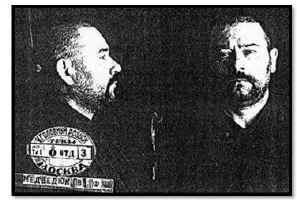 On
May 18th, 1931, novices Maria and Tatiana were arrested and
confined in Butyrskaya prison in Moscow. All in all, seventeen nuns
and novices from various convents, who had settled near the
closed-down Elevation of the Cross monastery, were arrested at that
time.
On
May 18th, 1931, novices Maria and Tatiana were arrested and
confined in Butyrskaya prison in Moscow. All in all, seventeen nuns
and novices from various convents, who had settled near the
closed-down Elevation of the Cross monastery, were arrested at that
time.
The
landlord of the house in Lemeshevo, where novice Tatiana lived,
testified that the novice does handiwork, which she sells to the
peasants of the neighboring villages, and that she is predisposed
against measures taken by the Soviet authorities. One of the false
witnesses testified that novice Tatiana was a zealous church person
and conducts active anti-Soviet activity. Another witness testified
that novice Maria had said to the peasants: “What do you need
kolkhozes for, and why should you join them, when in them violence is
being perpetrated against peasants? These days you, peasants, are
corralled in such a sty, where there are no laws prescribed.” And
the peasants supposedly hollered in response to the words of one of
the novices: “Matushkas are right, after all, they do know more than
us.”
During
interrogation, novice Maria said: “Towards the Soviet authorities I
feel nothing but disdain. The Soviets have strangled us. Communists
have instituted persecution of the Church, closing down churches and
demanding high taxes. As concerns the anti-Soviet agitation, I am not
guilty.”
On
May 29th, 1931, the OGPU tribunal convicted novices Maria
and Tatiana to five years of hard labor. Upon their release in 1934,
Maria settled in the village of Vysokogo, and Tatiana in the village
of Sheludkovo of the Volokolamsk region, and started assisting
Archpriest Vladimir in Trinity church. They were arrested in 1937
together with him.
During
their interrogation on November 26th, 1937, the novices
categorically refused to confirm the accusations made up by the
detectives, and refused to testify against anyone else. On November 28th,
the inquest was concluded, and the next day, the NKVD tribunal
sentenced Archpriest Vladimir to execution by firing squad, and
novices Tatiana and Maria to ten years of hard labor.
Meanwhile,
the wife of Father Vladimir, Varvara Dmitrievna, was notified that the
prisoners were being prepared to be sent to Moscow, and that the train
would pass the station closest to their village at 3:00 pm. She was
told that the prisoners would be transported in the first car, which
would be barred. Varvara Dmitrievna, with the children, came to the
train with provisions she wanted to give to her husband. The train
stopped, but the car with the prisoners was surrounded by guards, who
would not let anyone approach it. The family strained to search into
the barred windows and suddenly noticed that in one of them, there
appeared a hand and blessed them with a priest’s blessing. The train
remained at the station for three minutes, which to them seemed like
one moment. After the train’s departure, they were too exhausted to
walk back the three kilometers back home, while carrying things
intended for Father Vladimir. Just then, a teenager from Yazvische
came up to them and asked what had happened. They explained, and he
helped to carry everything back to their home.
Archpriest
Vladimir Medveduk was executed by firing squad on December 3rd,
1937, and buried in an unmarked mass grave in Butovo, near Moscow. He
was adjoined to the community of saints New Martyrs and Confessors of
Russia, for Church-wide commemoration, at the Jubilee Archbishop Sobor
of the Russian Orthodox Church in August of 2000.
Novice
Maria Briantzeva returned home after serving her sentence, and Novice
Tatiana Fomicheva accepted death while incarcerated.
Igumen
Damaskin (Orlovsky). “Martyrs, Confessors and Heroes of Devotion
of the Russian Orthodox Church in the XX Century”.
Tver,
Publishing House “Bulat”, volume 1, 1992; volume 2, 1996; volume
3, 1999; volume 4, 2000; volume 5, 2001.
Translated
by Anna Katsnelson.
Media
Office of the Eastern American Diocese

